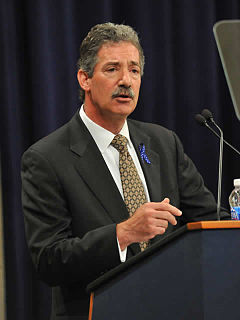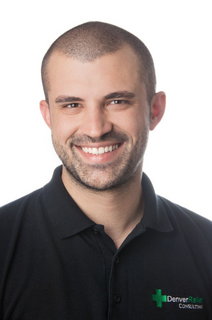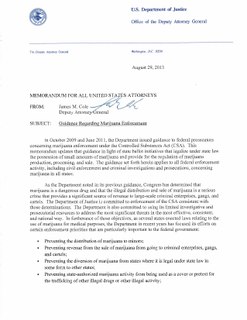Chris Bartkowicz is a state-licensed medical marijuana care-giver who was raided and arrested on the order of Denver area DEA agent Jeffrey Sweetin on February 12, 2010 after accepting an invitation by 9NEWS to do an interview about being a Colorado medical marijuana care-giver.
Sweetin's order to raid and arrest Bartkowitz came in defiance of President Barack Obama and United States Attorney General Eric Holder's directive not to enforce federal law against medical marijuana users and care-givers that operate in "clear and unambiguous compliance with state law". [1] This directive echoed a campaign promise by then candidate Obama that he would stop prosecuting doctor authorized medical marijuana patients and caregivers because he felt that using federal resources to circumvent state law on the issue of medical marijuana was a poor use of federal resources. [2] Despite the fact that Colorado voters amended the state constitution to allow medical marijuana, Sweetin proclaimed "We're still going to continue to investigate and arrest people... Technically, every dispensary in the state is in blatant violation of federal law," he said. "The time is coming when we go into a dispensary, we find out what their profit is, we seize the building and we arrest everybody. They're violating federal law; they're at risk of arrest and imprisonment". [3]
Several days after the arrest, Sweetin revised his argument and claimed that Bartkowicz was violating state law because he was in possession of 224 marijuana plants for 12 registered patients, while state law only allowed for a caregiver to have 6 plants and 2 ounces of marijuana per registered patient. [4] This same argument was echoed by prosecuting attorney David Gaouette. [5]
While Sweetin and Gaouette both argue that Colorado state law limits Bartkowicz to 6 plants and 2 ounces per patient as a care-giver, the wording of the Colorado state constitution never states a maximum number of plants that a care-giver may possess. The state constitution only sets a limit on the number of plants that a patient may possess. [6]
In response to the incident, Colorado attorney Rob Corry issued a formal complaint against the DEA and DOJ agents involved in the incident. He states that the DEA is trying to scare medical marijuana users and care-givers even though they are complying with state law and that these actions are a clear violation of the October 19, 2009 Department of Justice guidelines instructing federal agents not to use federal resources to prosecute medical marijuana users who are in compliance with state law. [7]
Colorado medical marijuana advocate and head organizer of a February 18, 2010 protest aimed to notify President Obama and raise public awareness of the DEA's recent actions, Brian Vicente, questions the motives of those involved "I think the U.S. Attorney and the DEA view marijuana laws as a continuing employment act. It gives them something to do, and they're afraid that if they were to recognize the will of the voters, they'd be out of work. So I question the motivation for prosecuting these kinds of individuals. I think it's driven by their own need for job security." [8]
Colorado Representative Jared Polis wrote to Attorney General Holder and President Obama requesting clarification on the issue of whether Sweetin's comments that the DEA will "arrest everybody" is United States policy regarding medical marijuana. [9] Polis is one of few congressman to take public notice of the DEA's failure to respect state law on the issue of medical marijuana even though a January 18, 2010 ABC poll shows that 81 percent of Americans support legalizing medical marijuana. [10]

Proposition 215, or the Compassionate Use Act of 1996, is a California law permitting the use of medical cannabis despite marijuana's lack of the normal Food and Drug Administration testing for safety and efficacy. It was enacted, on November 5, 1996, by means of the initiative process, and passed with 5,382,915 (55.6%) votes in favor and 4,301,960 (44.4%) against.

In the United States, the removal of cannabis from Schedule I of the Controlled Substances Act, has been proposed repeatedly since 1972. The category is the most tightly restricted category reserved for drugs that have "no currently accepted medical use.”
Medical necessity is a legal doctrine in the United States related to activities that may be justified as reasonable, necessary, and/or appropriate based on evidence-based clinical standards of care. In contrast, unnecessary health care lacks such justification.

In the United States, increased restrictions and labeling of cannabis as a poison began in many states from 1906 onward, and outright prohibitions began in the 1920s. By the mid-1930s cannabis was regulated as a drug in every state, including 35 states that adopted the Uniform State Narcotic Drug Act. The first national regulation was the Marihuana Tax Act of 1937.

The use, sale, and possession of cannabis over 0.3% THC in the United States, despite laws in many states permitting it under various circumstances, is illegal under federal law. As a Schedule I drug under the federal Controlled Substances Act of 1970, cannabis over 0.3% THC is considered to have "no accepted medical use" and have a high potential for abuse and physical or psychological dependence. Cannabis use is illegal for any reason, with the exception of FDA-approved research programs. However, individual states have enacted legislation permitting exemptions for various uses, including medical, industrial, and recreational use.
Charles C. Lynch is the former owner of a city sanctioned medical marijuana dispensary in Morro Bay, California. Lynch obtained a medical marijuana dispensary business license, a medical marijuana nursery permit and was a member of the local chamber of commerce. Lynch was compliant with California medical marijuana laws, but was prosecuted and convicted under federal marijuana laws. As of July 30, 2014, Lynch remained out on bail pending appeal.

In the United States, the use of cannabis for medical purposes is legal in 37 states, four out of five permanently inhabited U.S. territories, and the District of Columbia, as of February 2022. Eleven other states have more restrictive laws limiting THC content, for the purpose of allowing access to products that are rich in cannabidiol (CBD), a non-psychoactive component of cannabis. There is significant variation in medical cannabis laws from state to state, including how it is produced and distributed, how it can be consumed, and what medical conditions it can be used for.

Cannabis in California has been legal for medical use since 1996, and for recreational use since late 2016. The state of California has been at the forefront of efforts to liberalize cannabis laws in the United States, beginning in 1972 with the nation's first ballot initiative attempting to legalize cannabis. Although it was unsuccessful, California would later become the first state to legalize medical cannabis with the passage of the Compassionate Use Act of 1996. In November 2016, California voters approved the Adult Use of Marijuana Act to legalize the recreational use of cannabis.

Cannabis in Colorado has been legal for medical use since 2000 and for recreational use since late 2012. On November 7, 2000, 54% of Colorado voters approved Amendment 20, which amended the State Constitution to allow the use of marijuana in the state for approved patients with written medical consent. Under this law, patients may possess up to 2 ounces (57 g) of medical marijuana and may cultivate no more than six marijuana plants. Patients who are caught with more than this in their possession may argue "affirmative defense of medical necessity" but are not protected under state law with the rights of those who stay within the guidelines set forth by the state. The Colorado Amendment 64, which was passed by voters on November 6, 2012, led to recreational legalization in December 2012 and state-licensed retail sales in January 2014. The policy has led to cannabis tourism. There are two sets of policies in Colorado relating to cannabis use: those for medicinal cannabis and for recreational drug use along with a third set of rules governing hemp.

James Michael Cole is an American attorney who served as United States Deputy Attorney General from December 29, 2010 to January 8, 2015. He was first installed as Deputy Attorney General following a recess appointment by President Barack Obama on December 29, 2010. He then was confirmed by the United States Senate in a 55–42 vote on June 28, 2011.
Wo/Men's Alliance for Medical Marijuana (WAMM) is a not-for-profit medicinal cannabis dispensing collective located in Santa Cruz, California. WAMM was founded in 1993 by Valerie Leveroni Corral and her then-husband Michael Corral. Valerie Corral is also the Executive Director of Raha Kudo: Design for Dying Project, a non-profit corporation that provides education and research to support persons facing death and their caregivers. Members of WAMM receive organic medicinal cannabis at cost while volunteers trade work for cannabis. There is a compassion program for those unable to afford the full cost of medical cannabis. WAMM was the first medical marijuana collective to receive non-profit status from the United States Government.

Scott Feil is an American medical cannabis rights activist, complex aircraft pilot, and businessman. Most known for his involvement in the continuing court case involving Los Angeles Police Department illegal seizure of 209 pounds of medical marijuana, 21 pounds of hashish, 12 pounds of marijuana oil and amounts of U.S. legal tender amounting to $186,416.00 from his Los Angeles based United Medical Caregivers Clinic medical cannabis dispensary, UMCC LLC.
The Colorado Compassion Club, founded in 2004, opened a storefront in 2005 and registered with the Colorado Secretary of State in 2006, making it the first medical marijuana dispensary in the state of Colorado. This planted the seed in Colorado that grew into the first state to legalize recreational use by the Colorado Amendment 64 on November 6, 2012 along with the state of Washington.

Kayvan Khalatbari is an Iranian-American entrepreneur; he was a mayoral candidate in Denver, Colorado, in 2019.
The Kettle Falls Five is a name given to five defendants who were charged with 5 violations of federal law including growing, cultivating and distributing cannabis and firearms charges at their 33-acre property near the town of Kettle Falls in eastern Washington. This prosecution was done despite the defendants adherence to Washington State law allowing the growing of cannabis for medical use. One of the defendants, cancer patient Larry Harvey, was not permitted to argue his medical need for the plant in court. Despite this handicap, the defendants were acquitted of 4 out of 5 counts in federal court in Spokane, Washington on March 3, 2015.
Several US States have introduced various resolutions and legislation in protest to federal actions. Despite this, the Supreme Court has explicitly rejected the idea that the states can nullify federal law. In Cooper v. Aaron (1958), the Supreme Court of the United States held that federal law prevails over state law due to the operation of the Supremacy Clause, and that federal law "can neither be nullified openly and directly by state legislators or state executive or judicial officers nor nullified indirectly by them through evasive schemes ..." Thus, state laws purporting to nullify federal statutes or to exempt states and their citizens from federal statutes have only symbolic impact.

Amendment 20 was an amendment to state statutes, submitted for referendum in the 2000 general elections in the U.S. state of Colorado. The amendment was adopted by 54% of participating voters. Under the law, patients may possess up to 2 ounces of medicinal marijuana and may cultivate no more than six marijuana plants at a time. Patients who are caught with more than this in their possession may argue "affirmative defense of medical necessity" but are not protected under state law with the rights of those who stay within the guidelines set forth by the state.[4]
Cannabis advertising in Denver is regulated by Denver City Council in the state of Colorado. In 2012, Denver City Council voted to ban all outdoor medical marijuana ads.

The Cole Memorandum was a United States Department of Justice memorandum issued August 29, 2013, by United States Deputy Attorney General James M. Cole during the presidency of Barack Obama. The memorandum, sent to all United States Attorneys, governed federal prosecution of offenses related to marijuana. The memo stated that given its limited resources, the Justice Department would not enforce federal marijuana prohibition in states that "legalized marijuana in some form and ... implemented strong and effective regulatory and enforcement systems to control the cultivation, distribution, sale, and possession of marijuana," except where a lack of federal enforcement would undermine federal priorities.
Steve McWilliams was a medical marijuana activist from San Diego, California who protested the treatment of people under anti-cannabis laws. He committed suicide in 2005.